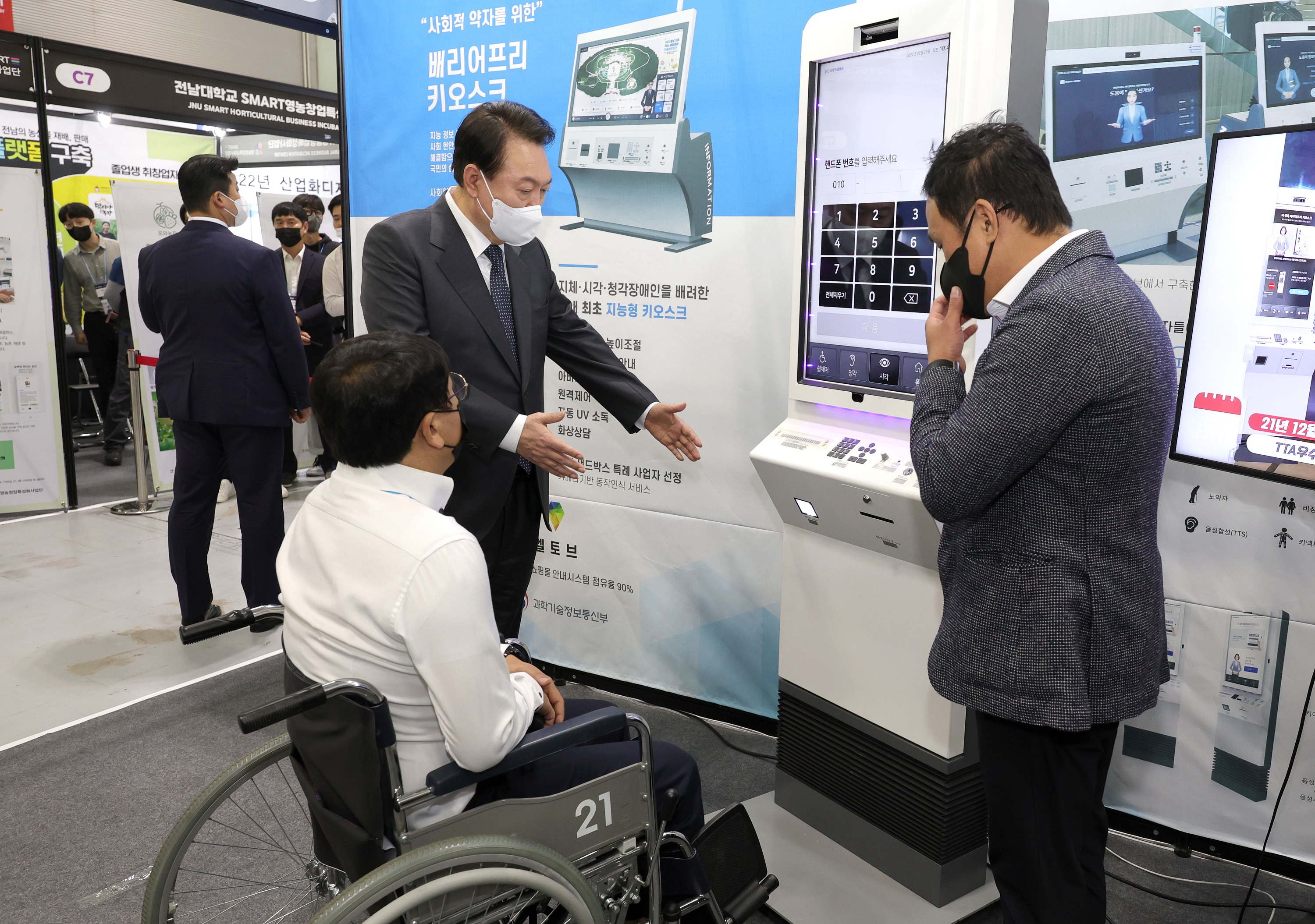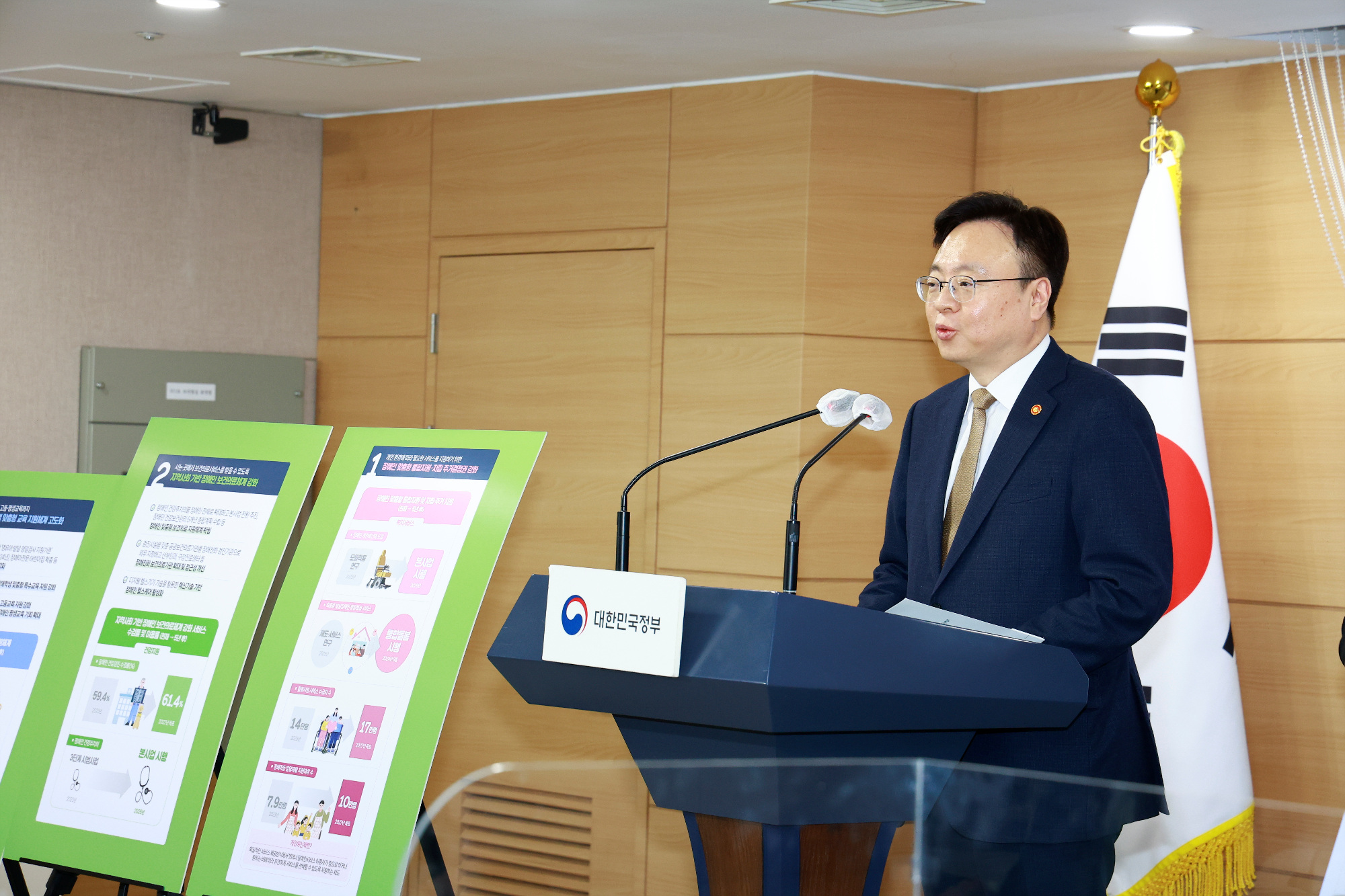[Mar] Korea finalizes 5-year policy roadmap for people with disabilities
Date Mar 23, 2023
 President Yoon Suk Yeol checks a “barrier-free” kiosk during the AI TECH+ exhibition at the Kimdaejung Convention Center in Gwangju, September 28, 2022. The kiosk, developed by a local IT company, offers features for the visually impaired such as enlarged buttons and audio guides, and the height of the control panels can be lowered for people in wheelchairs. (Korea Times file)
President Yoon Suk Yeol checks a “barrier-free” kiosk during the AI TECH+ exhibition at the Kimdaejung Convention Center in Gwangju, September 28, 2022. The kiosk, developed by a local IT company, offers features for the visually impaired such as enlarged buttons and audio guides, and the height of the control panels can be lowered for people in wheelchairs. (Korea Times file)
The Ministry of Health and Welfare recently finalized its five-year policy roadmap for people with disabilities with the main aim to provide customized support.
A budget of 31.3 trillion won (US$24 billion) has been earmarked for the plan that will be in effect from 2023 to 2027.
First of all, the ministry will work to provide people with disabilities greater access to self-service kiosks.
Kiosks have been introduced to provide advantages to both customers and retailers. Customers can benefit from fast service, while retailers can address labor shortages.
But these machines have sometimes become a barrier for people with disabilities due to limited accessibility – those in wheelchairs have often found the kiosks to be too high to reach, while the visually impaired have been unable to locate the right buttons on kiosk screens.
The ministry said it will encourage kiosk operators to ensure all customers can use the self-service machines regardless of any physical challenges, for example, by placing some kiosks lower so people in wheelchairs can easily access them and installing tactile tiles to help the visually impaired find the machines.
State-run institutions will be legally required to increase the disabled’s access to kiosks starting next year, and the requirements will be expanded to the private sector in 2026.
 Minister of Health and Welfare Cho Kyoo-hong announces the government’s five-year policy roadmap for people with disabilities at the Government Complex Seoul, March 9. (Courtesy of Ministry of Health and Welfare)
Minister of Health and Welfare Cho Kyoo-hong announces the government’s five-year policy roadmap for people with disabilities at the Government Complex Seoul, March 9. (Courtesy of Ministry of Health and Welfare)
The ministry will also work to enhance caregiving services for disabled people in a bid to reduce the burden on family members.
From April, a 24-hour caregiving service for up to one week will be provided for disabled people when their primary caregivers are away on a short-term absence.
Centers offering such services will be open in 17 cities and provinces on a trial basis before gradually expanding nationwide.
In June next year, a comprehensive care system for people struggling with serious disabilities will kick off, aiming to offer them training in daily activities and chances to enjoy hobbies. The ministry said a study is currently in progress to establish standards to define serious disabilities.
In addition, the ministry will carry out a pilot program with 120 disabled people on an “individual budget system,” which will allow people with disabilities to independently choose the type of medical, caregiving and other services they need. This system was one of the election pledges of President Yoon Suk Yeol.
The program will be carried out next year before going into effect in 2026. The amount of funding to be allocated per disabled person under the system will be decided during the pilot operation.
**If you have any questions about this article, feel free to contact us at kocis@korea.kr.**

The Ministry of Culture, Sports and Tourism's "Korea Here & Now" work can be used under the condition of "Public Nuri Type 1 (Source Indication)."




